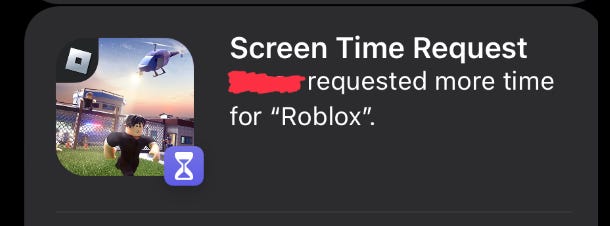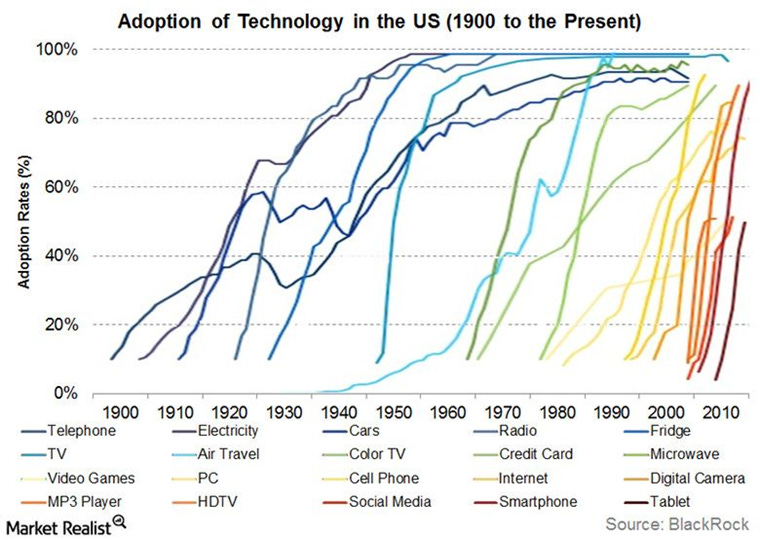Are We Sure?
How is technology affecting our human trajectory?
“Life, uh, finds a way.”
Let me bring you into my life with my 8-year-old in a nutshell:
“Dad!” … “DAAAADDDD!”
I shouldn’t assume anything with kids, but it becomes almost automatic.
“Yes?”
“Check you texts!”
She’s snickering as I switch apps and see her emoji face requesting more time on Roblox.
Multiple things go through my head when I see this:
What time is it?
How much screen time has she had today?
Is it a school day?
Am I doing something I need to focus on that more time would help me accomplish?
Where’s her mother, lol
I take inventory: 7:10 pm on a Wednesday, 50min until bed, and I’m on Reddit as my wife puts my toddler down.
I brace for it: The incoming barrage and attempt to convince me WHY she needs more time, sometimes followed by a tantrum. She’s mine so that Hulk is lurking right below the surface, which when unleashed, turns my logical brain into a primordial soup of emotion. Not great to get to an 8-year-old’s level.
I deny the request and send a signature gif of my reaction:
“DAAAADDDDD WHYYY?!”
Before I can answer, I hear her laughing-a good sign. And. Here. We. Go! The Apple iMessage text bubbles start churning as we get into a GIF war.
“Get yer pitchforks!”
So before I start getting blasted by the infinite gradient of the online consortium of we-know-what’s-best-a-crew, I understand where I sit inside the circle of parental judgment.
I won’t bother with statistics to prove my point (though this article from the Mayo Clinic is pretty good), but here are a few anecdotes from a viewpoint of a new world as I see it, and honestly, it comes back to a fundamental of how we learn: Trust but verify.
Deny screens?
Denying screens these days feels like social suicide and borderline irresponsible. The bottom line is they’ll get it from somewhere - a friend, etc. Closing off this ubiquitous part of our lives only creates a ‘rubber band’ of pent-up energy to navigate a digital landscape that’s extremely dangerous without guidance and help.
Allow All screens?
This is giving up, plain and simple. I don’t see any difference between this and denying everything, this just backloads the issues whilst denying everything frontloads the drama. Regardless, unfettered access has its risks. Sure, many live in an Instagram/Facebook society where their lives are cataloged from everything they eat down to their kids’ interactions multiple times a day.
The effect is a child who sees a screen as a normal outlet for their lives (not bad), but human nature takes over, and not managing what they’re doing puts them at risk of destroying their lives online in the future.
It’s also easy to get out of parenting this way.
Put effort into managing screens?
Not a perfect solution and it will cut DEEP into your personal solitude, but providing digital guardrails ensures some KEY things:
Starting young, this creates a necessity to come to you for their digital needs.
It creates rhetoric between you and them on what they’re doing
It helps you understand their technology abilities (no more, “Not my Billy! He doesn’t even know what a (insert device) is!”
Most importantly, it creates a feedback mechanism for them to explore somewhat safely.
This next part isn’t cheap, nor can I say it’s for everyone, but I have landed on a decent system. I’ve tried Amazon’s and now Apple’s controls. I also am an ‘expert’ (lmao) on Chromebooks and Nintendo Switches.
We moved from Amazon to Apple because, well:
My wife and I have iPhones, and so do our extended family and good friends.
It is more secure with things like encrypted iMessage, recovery options in case of an incident, health alerts, contact controls, screen controls, etc.
The parental controls are streamlined into the iOS software - no extra apps to download and manage.
We wanted to expand our daughter’s ability to communicate with her family (we live away from all of them) but without opening her up to the world.
We see an Apple Watch in her future with cellular far before she gets a phone-call text, without social media and web capabilities anywhere.
So get your pitchforks, post-COVID, this world is undeniably connected. I’d rather navigate it WITH my kids than at a distance.
But what’s in store?
“Into the unknown!”
God, ‘Frozen’ got it right. (Apologies for bringing that into your head. If you know, you know.)
Looking forward requires us to look backward. Consider this:
The iPhone has been out a bit less than 16 years (2007)
The public cloud’s rise to dominance only started around 10 years ago (2013).
COVID hit the world three years ago (2020) requiring many to work remotely for months. Even today, hybrid work is the norm.
In fewer years than most of us have been alive, we’ve seen a transformation only compared to the rise of the internet. And before that, the rise of digital computation.
We’re hitting an exponential stride leaving linear growth behind. What does this mean for our children and ourselves? In reality, the foundational technologies of the next 20 years are already in motion.
Ever wonder why common technologies like the microwave or air travel seem to have stagnated in our minds when we compare them to social media or the smartphone? It’s a compounded cycle of exponential adoption built on previous innovations.
Sooner, not later, this model will ‘tip’, and new inventions we’ve not heard of will already be predominant and ubiquitous.
Case in point, ChatGPT, the AI chatbot that was released in November of 2022, only to have 100M users interface with it just two months later in January 2023.
These advances should be unleashing humankind from menial tasks, but instead are being exploited through socioeconomic models like capitalism allowing those with the means to grow more powerful.
We stand at a precipice for our existence: Do we allow ourselves to become enslaved by the very technology we’ve created to liberate us? Or do we let go and refocus on the greater unknown?
I think frequently of the Kardashev scale on our place in breaking through its model. I wonder how many other civilizations strewn across our young universe have also gotten to this point; only ~14 billion years old with a life span of trillions of years to go. Are we on a trajectory to become stellar dust and join the others? Or are we something more? Is the more? Are there others?
And here I sit, contemplating a digital request from my daughter, a few feet away to interact with a digital world on a device that didn’t exist a few years ago.
It’s time we teach responsibility. It’s time we enable ourselves to do more.
End of line.









